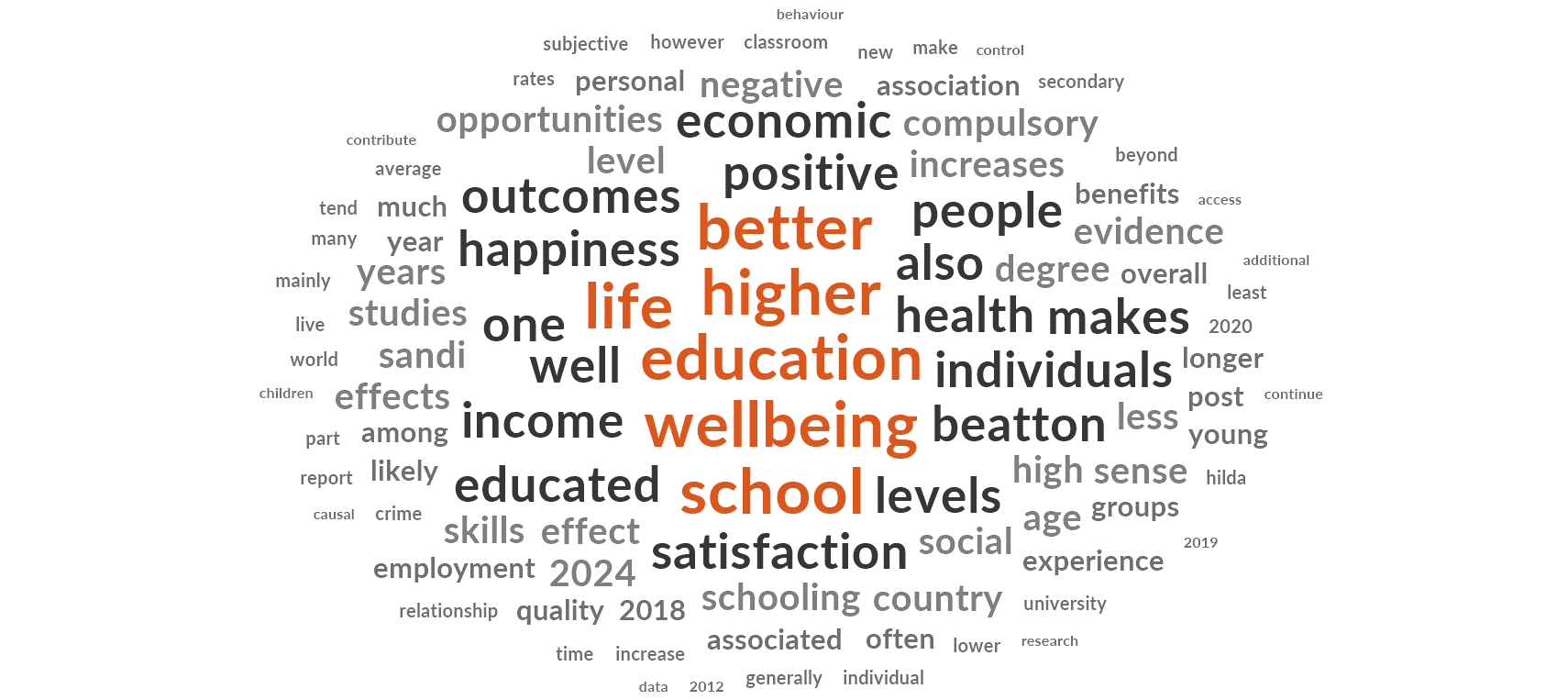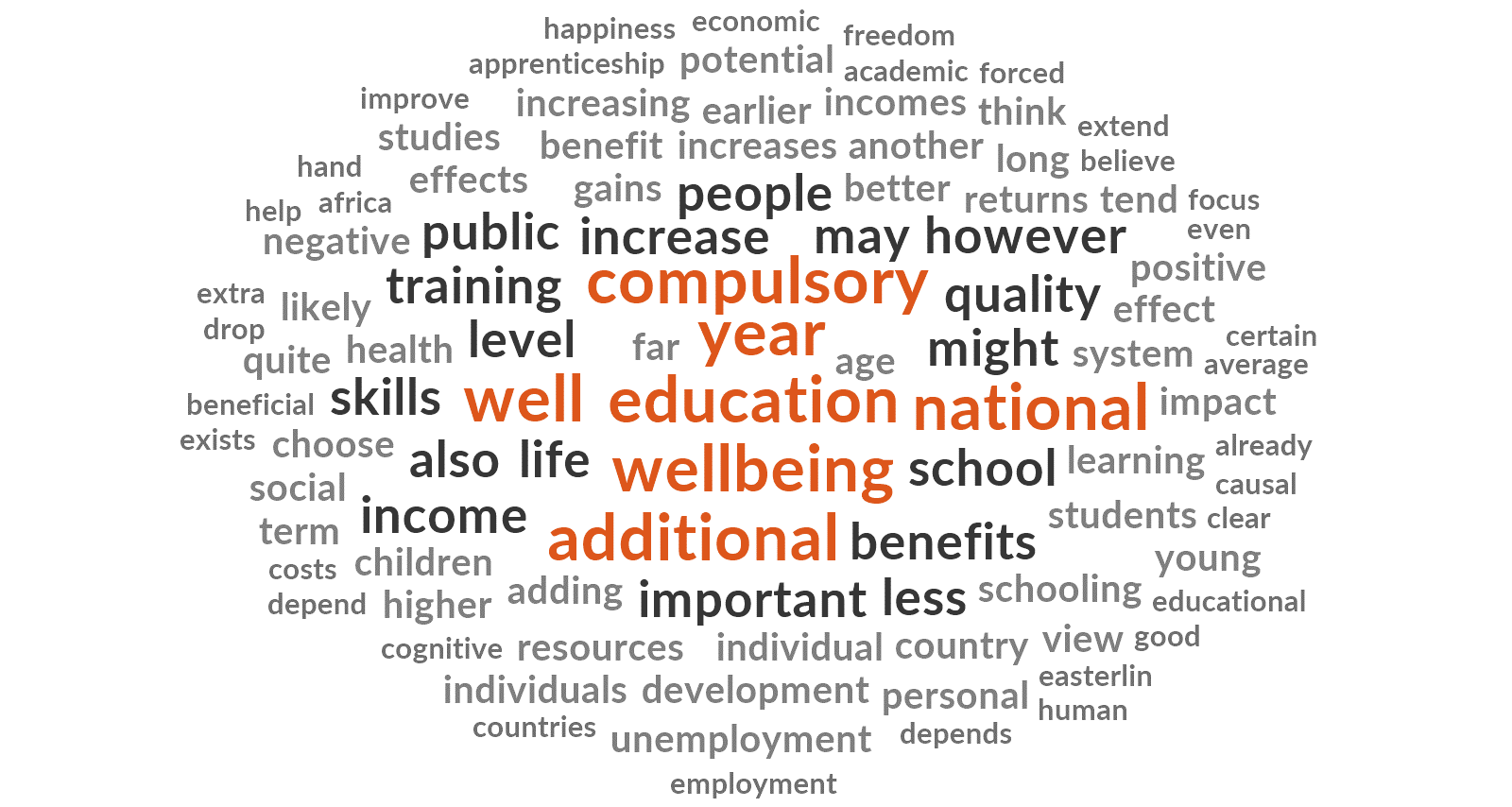-
Neither agree nor disagree Happiness studies using the Australian HILDA panel data generally show that more educated individuals have lower life satisfaction; as at HILDA 2002-2022, -0.059 units/year of education (Frijters & Beatton, 2012, Beatton & Frijters, 2024), but the HILDA mainly surveys adult happiness. The Education/ Child Development literatures (Heckman, Pinto, Savelyev, 2013) more widely find that more education improves: high school graduation rates (Leigh, 2009); university entrance; the probability of an adult getting a higher paid job; reducing crime, among other positives. These are all supposed to increase happiness. But, these studies tend to focus on the less well off in our communities (Heckman & Karapakula, 2019). Additional education can occur at the beginning or end of a child’s K-to-12 schooling. Causal analysis of policy changes involving an additional year of mandated education at the end of high school has been shown to increase the years of average high school education and graduation rates, but, much of this student retention arises from students who have to stay at school because they haven’t reached an age where they are eligible to drop-out; this would make them unhappy, and, these individuals are unlikely to be in our happiness surveys. There are negative and positive unintended consequences to forcing young people to stay at school longer. While youth crime has been generally shown to reduce (Beatton, Kidd, Machin & Sarkar, 2018), which makes us happy, recidivist criminal youths did not change their criminal behaviour; this makes us more unhappy. The results are different when the additional year of education comes at the beginning of school, crime reduces for all, including the recidivist (Beatton & Sandi, 2023). This arises mainly from higher quality early childhood education, which improves behaviour (Thorpe, Potia, Beatton, Staton Rankin, 2020; Thorpe, Rankin, Beatton, Sandi, Siraj, & Staton, 2020) and school outcomes (Beatton & Sandi, 2024). But the above noted positives do not hold for the unhappy poor in our community (Beatton & Sandi, 2024), this cohort of our society is deserving of more happiness research attention. For example, forcing young persons to remain in school when they would have otherwise chosen to drop-out increases unacceptable behaviour in the classroom resulting in increases in school sanctions, exclusions, and expulsions (Beatton, Kidd & Sandi, 2022). Students forced to stay at school: behave less well in the classroom; put in less classroom effort, and; disrupt the learning of their classroom peers; probably reducing happiness. The socio-economic panel data we tend to use in our happiness studies does not include the young, but, the 2024 World Happiness Report did (WHS, 2024). It noted the declining happiness and increased pessimism (negative affect) in the young from western nations. There should be more happiness studies focussed on the young; happy children beget happy adults. ? References Beatton, T & Frijters, P. (2024). Shocks, Mental Health, and Life Satisfaction. Working Paper, BEST Centre QUT. Beatton, T & Sandi, M. (2023) Does a year of free early childhood education reduce crime among the most disadvantaged. Working Paper, BEST Centre QUT. Beatton, T., Kidd, M. & Sandi, M (2022). School Indiscipline & Crime. Cesifo Working Paper 9526. Munich Society for the Promotion of Economic Research - CESifo GmbH Beatton, T., Kidd, M. P. and Machin, S. & Sarkar, D. (2018). Larrikin Youth: New Evidence on Crime and Schooling. Labour Economics Volume 52, June 2018, Pages 149-159. Heckman, J. J., & Karapakula, G. (2019). Intergenerational and intragenerational externalities of the Perry Preschool Project (No. w25889). National Bureau of Economic Research. Heckman, J. Pinto, R, & Savelyev, P. (2013). Understanding the Mechanisms Through Which an Influential Early Childhood Program. Boosted Adult Outcomes. American Economic Review, 103(6), 2052-2086. Thorpe, K., Potia, A., Beatton, T., Staton, S & Rankin, P (2020). Educational Outcomes of Queensland_ Final Report_22October2020. Queensland Department of Education Horizon Project Report. The University of Queensland. Thorpe, K., Rankin, P., Beatton, T., Sandi, M., Iram Siraj, I. & Sally Staton, S. (2020). The when and what of measuring ECE quality: Analysis of variation in the Classroom Assessment Scoring system (CLASS) across the ECE day. Early Childhood Research Quarterly. WHS (2024) World Happiness Report. Home | The World Happiness Report
Doctor Tony Beatton
Visiting Fellow, Queensland University of Technology (QUT) -
Completely agree Further education in Switzerland is of high quality and substantially adds to the productivity of people.
Professor Alois Stutzer
Professor of Political Economics, University of Basel -
Agree The question is about association, not causation. The association mainly holds because the educated live longer. That is partially selection (the healthy are better at doing school), partly economic-rationality (if you know you have longer to live investing more in education makes sense), part direct causality (the educated learn better health habits). The effects of education on the level of wellbeing in each year seem minimal.
Professor Paul Frijters
Professorial Research Fellow, CEP Wellbeing Programme, London School of Economics -
Agree Getting a degree tends to boost later life earnings and health which are both important elements of lifetime wellbeing. I guess there are the negatives of student loan debt for recent generations, and of course it all depends on what degree at what university. I don't know about other effects: I guess its possible that degree level learning makes people feel a bit more miserable, but on the other hand it might improve their objective wellbeing a bit.
Professor Richard Cookson
Professor, Centre for Health Economics, University of York -
Completely agree Education in my country is key for individuals’ wellbeing in several dimensions. Not only does education allow individuals to have jobs that correlate with greater wellbeing (more autonomy and creativity, higher wages, etc.), but higher educated individuals experience also much lower levels of unemployment and higher re-employability if they lose their job. In my country, in addition, education correlates with social and political participation and more free time. High educated individuals, in my country, have also better access to health and their children enjoy better education, on average.
Professor Ada Ferrer-i-Carbonell
Professor of Economics, IAE-CSIC -
Neither agree nor disagree The relationship between education and wellbeing is weak, and evidence is often inconsistent, not always showing a positive relationship. There are more important factors for wellbeing such as relationships, health, and social and emotional skills. To the extent that education does bring about wellbeing, it is indirectly via increases in health, status, and income. One concern with education is that it raises expectations, which can have a negative effect on wellbeing if not met.
Doctor Christopher Boyce
Honorary Research Fellow, University of Stirling -
Completely agree While there has been debate in the literature about whether or not more education makes people happier, my reading of the evidence from Australia, and more specifically from the HILDA Survey (including my own research), leads me to the conclusion that education does raise individual well-being. The magnitude of these associations, however, likely varies with how well-being is measured (Nikolaev 2018). It also depends on what else is being controlled for, with the positive effects of education on long-run well-being often arising through its enhancing impacts on employment outcomes and incomes, or in facilitating the making of better lifestyle choices that impact health and relationships (Powdthavee et al 2015). Nikolaev, B., 2018. Does higher education increase hedonic and eudaimonic happiness?. Journal of Happiness Studies, 19, pp.483-504. Powdthavee, N., Lekfuangfu, W.N. and Wooden, M., 2015. What's the good of education on our overall quality of life? A simultaneous equation model of education and life satisfaction for Australia. Journal of Behavioral and Experimental economics, 54, pp.10-21.
Professor Mark Wooden
Professorial Research Fellow and Director of the HILDA Survey Project, Melbourne Institute: Applied Economic and Social Research, Faculty of Business and Economics, University of Melbourne -
Agree Higher education provides training in hard and soft skills like empirical observation/analysis, self-discipline, and reflection that are helpful in supporting one's health. Compared to a counterfactual of no post-compulsory schooling, taking part in a higher education program with other students also increases the expected power and resource control represented in one's professional networks, providing a higher informal safety net that can be drawn on in case of unexpected negative shocks (including to health) later in life. For men at least, it also opens up a wider pool of women as potential partners, increasing the likelihood of partnership which itself is good for wellbeing (again, particularly for men). To a much smaller extent, higher education may directly provide information relevant to health. An argument also exists that the more educated one is about the complexity and problems of the world, the more overwhelmed and potentially anxious or depressed one gets, particularly in the modern world where so much of higher education curricula is contaminated by depressing and even self-harming ideologies - that in a sense "ignorance is bliss". My sense and read of the relevant literatures is that the net effect of post-school education on wellbeing is probably positive in expectation.
Professor Gigi Foster
Professor, School of Economics, UNSW School of Economics -
Agree In South Africa, compulsory education is up to grade 9 or the age of 15 years. For individuals who attain higher levels of education, well-being increases and is closely correlated to their years of schooling. Those with tertiary education have the highest levels of well-being. South Africa suffers from very high levels of unemployment exceeding 40% (expanded definition) and skills scarcity. Therefore, those with higher levels of education have a better opportunity to find employment and earn income, which is also highly correlated with levels of well-being in the country.
Professor Talita Greyling
Professor, School of Economics, University of Johannesburg -
Agree A better education is generally associated with better labor market outcomes, i.e., more income and less risk to become unemployed. Income and stable employment contribute to subjective well-being.
Professor Andreas Knabe
Professor (Chair in Public Economics), Otto-von-Guericke-University Magdeburg -
Agree People with greater formal education, on average, earn higher incomes than those who do not. The positive relationship between income and SWB results in a positive association between qualification levels and wellbeing (mediated through income). There is, however, little evidence that education adds to SWB beyond its effect via income - both in my country, New Zealand (Carver and Grimes, 2019), and more generally (Boarini et al., 2012). References Boarini, R., C. Smith, R. Manchin and F. de Keulenaer. What Makes for a Better Life?: The Determinants of Subjective Well-Being in OECD Countries—Evidence from the Gallup World Poll. 2012. OECD Statistics Working Paper 2012/03, OECD Publishing, Paris. Carver, T. and A. Grimes, Income or Consumption: Which Better Predicts Subjective Wellbeing?. 2019. Review of Income and Wealth, 65, S56-S280.
Professor Arthur Grimes
Chair of Wellbeing and Public Policy, School of Government, Victoria University of Wellington -
Agree It is important to note that individual experiences may vary due to factors such as socioeconomic background, access to resources, and personal circumstances, which can influence the extent to which education impacts wellbeing. The quality of education and support systems also play significant roles in determining outcomes. With that being said, in New Zealand, several studies showed that individuals who continue their education beyond compulsory schooling tend to have higher life-time wellbeing. Individuals with education beyond compulsory schooling often experience higher earning potential, i.e., higher salaries and better job prospects. This leads to financial stability, thereby contributing to overall wellbeing by providing individuals with greater economic security. Additionally, continuing education opens up opportunities for personal and professional growth. It allows individuals to pursue their interests, develop new skills, and explore potential career paths. This sense of fulfilment and achievement can enhance overall life satisfaction. Furthermore, education is also linked to better health outcomes. Individuals with higher levels of education tend to make healthier lifestyle choices, have access to better healthcare, and experience lower rates of chronic illness. Improved health can significantly contribute to overall wellbeing and quality of life. Lastly, education provides opportunities for social interaction, networking, and personal development. It can help individuals build strong social connections, develop critical thinking skills, and increase resilience in facing challenges. These social and emotional benefits contribute to overall life satisfaction and wellbeing.
Professor Stephanié Rossouw
Associate Professor, School for Social Science and Public Policy, Auckland University of Technology, New Zealand -
Agree Higher qualifications are consistently associated with higher life satisfaction in cross-sectional data. However, this effect disappears when the main transmission channels via which higher education affects life satisfaction (income, health) are controlled for. Also, for groups with poor life outcomes - such as social housing tenants - higher education is associated with lower life satisfaction after controlling for other drivers suggesting that disappointed expectations have a non-trivial impact on life satisfaction (Davies and Smith, 2020).
Doctor Conal Smith
Principal, Kōtātā Insight -
Completely agree Consistent with the published evidence on the positive effect of formal education on wellbeing.
Professor Philip Morrison
Professor Emeritus, School of Geography, Environment and Earth Sciences Victoria University of Wellington (Te Herenga Waka) -
Agree It is certainly true that, in Germany, individuals who continue in education after compulsory education ends, obtain higher life-time wellbeing than they would have otherwise. But this overall effect is largely an indirect one -- one that is mediated by higher income and better health. There are negative comparator effects which practically neutralize any positive direct wellbeing effect of 'own' education (Clark et al. 2018, Table 3.4). Individuals with an 'upper secondary' or tertiary degree are less satisfied than those with a 'lower secondary' degree. Reference: Clark/Fleche/Layard/Powdthavee/Ward (2018), The Origins of Happiness: The Science of Well-Being over the Life Course, Princeton/Oxford.
Professor Heinz Welsch
Professor of Economics, University of Oldenburg -
Agree On average, education has positive causal effects on income and health, which are major contributors to well-being.
Professor Daniel Benjamin
Associate Professor of Economics, University of Southern California -
Agree By looking at the BES 2023 Report of the Italian National Institutional of Statistics (ISTAT), which conducts a specific annual survey, we can read the following: "The percentage of those who are very satisfied with life is higher among those who have obtained at least a university degree (50.9%), however the gap compared to those with a low qualification or no qualifications (44.1%) has decreased by 6.8 percentage points, by virtue of a slight decline in the share of satisfied people among graduates and a slight increase among those with at most a middle school diploma. This applies to all age groups with the exception of the youngest up to 34 years of age, among whom there are no differences. For all age groups, as the level of education increases, the share of those who have a positive expectation for the future increases. Those with at most a middle school diploma believe in 22.7% of cases that their life will improve and in 14.8% that it will get worse in the next 5 years. For those with at least a university degree the percentages are 40.8% and 9.7% respectively. Even in the previous years the differences were similar."
Professor Maurizio Pugno
Full Professor of Economics, University of Cassino -
Agree In Canada, attendance in school is compulsory up to age 16 in most provinces, and up to 18 (or when high school has been completion) in Manitoba, New Brunswick, and Ontario. Statistics Canada recently found that 73% of Canadians aged 25 to 34 had earned a postsecondary qualification, though those are not mostly undergraduate degrees. Given that there is some reasonable choice about what kind of post-secondary education to pursue, and given the social, status, and economic benefits associated with education credentials and experience, it seems likely that most people who have such education are better off than had they been denied it. On the other hand, there needs to be sufficient choice for people to have an appropriate kind of post-secondary schooling to pursue, and forcing everyone to do the same thing would not make sense for wellbeing. Failing at school or being there when not motivated is not likely helpful in the long run. While life satisfaction regressions often show no benefit, or a negative benefit, from post-secondary education, or at least the undergraduate and beyond kind, I have recently shown that most or all of these counter-intuitive estimates can be explained by a measurement error due to variation in reporting behaviors by those facing SWB questions.
Professor Chris Barrington-Leigh
Professor, McGill University -
Agree In accordance with the human capital theory, education is an investment that enhances an individual's opportunities in life, makes him more marketable and improves his earnings potentials and career mobility path. During the apartheid period, higher education opportunities were limited for the formerly disadvantaged groups. With democracy since 1994, more opportunities are opened up to these groups. Many who complete secondary education follow tertiary education. With the current labour market situation, many individuals cannot get jobs in line with their education fields. Accordingly, many get bursaries from the private sector and study loans from the government to advance their education further to postgraduate levels (Masters and PhD) as a basis for higher-level employment and earning opportunities, potentially contributing to higher life-time wellbeing. Higher education also has a positive impact on the country's economic growth rates at the macro level. At the micro personal level, individuals who continue in education are able to obtain skills and abilities make them more adaptable to the rapidly changing local and global market conditions, and enhance their propensity to better personal health care, stress coping mechanisms and healthy behavioural practices, with intergenerational implications to their children and family.
Professor Darma Mahadea
Associate Professor and Honorary Research Fellow at the University of Kwazulu-Natal, South Africa -
Completely agree While education is not always positively related to subjective well-being, that is often because researchers are not focusing on education alone and consequently include many downstream variables. Education is positively associated with most of the variables we think of as being good for subjective well-being. When one attains higher education, they are likely to experience better health, employment, and relationship outcomes. (Much of the evidence here is correlational but there are supporting causal studies too.) If we control for those variables, then we control for part of the benefits of education. We are also less likely to adapt to the benefits of better education, because we do not adapt to all of the benefits.
Doctor Kelsey J O'Connor
Researcher in the Economics of Well-being

In April 2024, members of the World Wellbeing Panel were asked for their views on two statements relating to wellbeing impacts of homeownership and government policies towards homeownership.
The two statements were as follows:
Statement 1: In my country, individuals who continue in education, after compulsory education ends, obtain higher life-time wellbeing than they would have otherwise.
Statement 2: Adding a year of compulsory education would increase national wellbeing.
Response options for each statement were: “completely agree”, “agree”, “neither agree nor disagree”, “disagree”, “completely disagree”.
In my country, individuals who continue in education, after compulsory education ends, obtain higher life-time wellbeing than they would have otherwise.
Adding a year of compulsory education would increase national wellbeing.
-
Neither agree nor disagree In the absence of more studies that follow individuals and socio-economic cohorts from pre-school to retirement, the jury is out on this proposition.
Doctor Tony Beatton
Visiting Fellow, Queensland University of Technology (QUT) -
Completely disagree Quite to the contrary, for some students it might be better if they were to leave school earlier to start some practical education/training in an apprenticeship. The ninth year can be a waste of resources for everybody involved. It could be required that they start some (preparation for an) apprenticeship earlier.
Professor Alois Stutzer
Professor of Political Economics, University of Basel -
Neither agree nor disagree I used to think this was true and that it held in the past, but I am skeptical that it is still true today in rich countries. The education systems have deteriorated so much the last 10 years that I actually doubt spending another year in them helps those lukewarm to remain in them (which is the group you'd force into another year via compulsion). More vocational training and on-the-job training might well be better.
Professor Paul Frijters
Professorial Research Fellow, CEP Wellbeing Programme, London School of Economics -
Disagree This would depend somewhat on the nature of this "education" and whether it could include things like apprenticeships, voluntary work, or indeed military service, as well as academic education. But on the whole it sounds like a costly an unpopular policy that would cause more trouble than its worth - there are more important priorities.
Professor Richard Cookson
Professor, Centre for Health Economics, University of York -
Completely agree In my country more than adding an additional year of compulsory education, we would need an education reform in which education levels are adapted to the needs, capacities and interest of the students. This would reduce drop outs and increase the amount of education of everyone. There needs to be investment in better education.
Professor Ada Ferrer-i-Carbonell
Professor of Economics, IAE-CSIC -
Neither agree nor disagree I do not think an additional year of compulsory education would increase national wellbeing. Maybe some would benefit learning additional skills becoming more productive and earning a higher wage later in life, but many young adults would go beyond compulsory anyway. Others would be forced to continue learning within an education system that hasn’t been working for them, which would be detrimental to their wellbeing. That being said, the above is my view if the education system were to remain broadly the same, i.e. through focusing only on academic/cognitive learning and achievement. From a wellbeing perspective there might be considerable gains if the education system were to focus on meaningful life skills, some of these directly related to wellbeing. Education systems throughout the world attempt to equip our children with skills that boost their productivity and later life incomes. However, we know that income has only a small effect on wellbeing, whereas relationships, health, and social and emotional skills are far more important, and therefore an additional year of compulsory education in an education system that emphasised supporting development in these important wellbeing areas might increase national wellbeing.
Doctor Christopher Boyce
Honorary Research Fellow, University of Stirling -
Neither agree nor disagree I am far less certain with my answer here. On the one hand, if young people tend to heavily discount the future then they will tend to underinvest in anything where the returns take a long time to be realized. Thus an additional year of compulsory education should lead to an increase in population well-being on average. On the other hand, the minimum school leaving age in Australia is currently 17 and the returns to increasing it to 18 will be far less than the returns to raising it from 15 to 16 and 17. Moreover, the gains are probably only large when the additional year of education causes individuals to extend further their education. For those that cease education as soon as they reach the required age, the long-run benefits may be quite small, and indeed offset by a decline in well-being in the short-term: By being forced to spend another year doing something that they do not enjoy and may be gaining no benefits from.
Professor Mark Wooden
Professorial Research Fellow and Director of the HILDA Survey Project, Melbourne Institute: Applied Economic and Social Research, Faculty of Business and Economics, University of Melbourne -
Neither agree nor disagree It depends on what is included in that year. The potential certainly exists for it to increase wellbeing, even though some of the benefit of higher education today relies on it being undertaken only by a fraction of people (e.g., the dating market expansion for men).
Professor Gigi Foster
Professor, School of Economics, UNSW School of Economics -
Agree Adding a year to compulsory education in South Africa has the potential to improve well-being, as higher levels of education increase employment opportunities, decrease youth unemployment, and provide other social benefits. However, the education should be of a high quality. There is no benefit in keeping children in school if the quality of education is poor and if there are no measures to validate or test the quality of education (South Africa has minimal strategies to determine the quality of education in schools and to take affirmative action to improve the quality of education). Furthermore, there is often a lack of infrastructure and well-trained teachers.
Professor Talita Greyling
Professor, School of Economics, University of Johannesburg -
Neither agree nor disagree While the positive effects of education are quite clear on the individual level, it is less clear that more education for all would increase the well-being of all. More education for all would increase general productivity and overall incomes. This might be seen as beneficial for well-being as it raises material living standards and allows providing better public services. As we know from the Easterlin paradox, however, raising incomes for all does not necessarily raise the happiness of all if income is mainly a status good.
Professor Andreas Knabe
Professor (Chair in Public Economics), Otto-von-Guericke-University Magdeburg -
Completely disagree Most people choose when to leave school after balancing the positives and negatives of attending an educational institution for an extra year. Forcing people to stay an extra year is likely to result in negative outcomes for many individuals, especially those who find their current institution to be boring or oppressive.
Professor Arthur Grimes
Chair of Wellbeing and Public Policy, School of Government, Victoria University of Wellington -
Neither agree nor disagree The impact of adding a year of compulsory education on national wellbeing can vary depending on various factors. An additional year of compulsory education could enhance national wellbeing by increasing human capital since you potentially have a more educated population with a broader skill set and knowledge base. It could also lead to reducing inequality because all children would have access to a certain level of education, which could help reduce socioeconomic disparities. An additional year could also help an individual adopt healthier behaviours, improving public health and increasing national wellbeing. However, implementing an additional year of compulsory education would require significant resources, including funding for additional school facilities, teachers, and educational materials. There may also be logistical challenges in accommodating more students, particularly if infrastructure and resources are limited. While compulsory education can provide a foundation for lifelong learning and personal development, it's important to recognise that individual circumstances and preferences vary. For some students, an additional year of compulsory education may be beneficial, while others may prefer alternative pathways such as vocational training or entering the workforce earlier.
Professor Stephanié Rossouw
Associate Professor, School for Social Science and Public Policy, Auckland University of Technology, New Zealand -
Neither agree nor disagree This depends entirely on the marginal returns of an additional year of compulsory education on income and health (and other less important transmission channels from education top life satisfaction). To the degree that some of the benefits of education are positional rather than substantive their might be no or even a negative impact.
Doctor Conal Smith
Principal, Kōtātā Insight -
Neither agree nor disagree It would depend on the level of education being incremented.
Professor Philip Morrison
Professor Emeritus, School of Geography, Environment and Earth Sciences Victoria University of Wellington (Te Herenga Waka) -
Neither agree nor disagree The effect on national (= average) wellbeing seems to be unclear in view of the comparator effects mentioned with respect to question 1. With respect to the indirect effect via national income, there may be short term gains in wellbeing, but long-term gains -- in rich countries -- are questionable in view of the Easterlin paradox.
Professor Heinz Welsch
Professor of Economics, University of Oldenburg -
Agree Evidence from increases in the compulsory schooling age indicates that such increases have caused increases in income and health. An additional year of schooling would likely have similar effects.
Professor Daniel Benjamin
Associate Professor of Economics, University of Southern California -
Completely agree I completely agree for two reasons: first, the benefits of schooling is usually underestimated (Oreopoulos 2007, Oreopoulos & Salvanes 2011); second, young people are recently distracted by social media with negative (causal) consequences on their well-being (Pugno 2024). References: Oreopoulos, Philip. 2007. “Do Dropouts Drop Out Too Soon? Wealth, Health, and Happiness from Compulsory Schooling.†Journal of Public Economics, 91(11–12): 2213–29. Oreopoulos P, Salvanes KG (2011) Priceless: non pecuniary benefits of schooling. Journal of Economic Perspectives 25:159-84 Pugno M. (2024). Social media effects on well-being: the hypothesis of addiction of a new variety. Kyklos (forthcoming)
Professor Maurizio Pugno
Full Professor of Economics, University of Cassino -
Disagree This could not be done at the national level in Canada, and as I mentioned above, we already have variation at the provincial level in how much school is compulsory. Choice to make decisions in life is an important support of wellbeing, so we might already have the balance right. Experiments and causal identification studies about changes to mandatory education ages, which tend to focus only on wage as an outcome, also have the challenge of not taking into account zero-sum aspects of the job market. Instead of adding quantity, I think we need to keep thinking about what kind of education is needed, and not assume that public education should all be stacked at the beginning of life. We could use options for public education throughout the life course, so that society can equitably and widely share best practices and knowledge about parenting, marriage, career transitions, retirement, old age, etc for maximal wellbeing.
Professor Chris Barrington-Leigh
Professor, McGill University -
Agree Empirical studies confirm that each year of quality education has a positive impact on an individual's earnings and cognitive skills, increases personal wellbeing, and contributes to enhancing a country's economic growth potential. Hence, to the extent possible, more public resources are to be devoted to extend the education life of learners to drive national wellbeing. School drop out rates should also be under control, and each additional year of schooling and training should not raise the unemployment rate. A positive correlation exists between a country's Human Development Index and its happiness level. However, rising NEET and unemployment rates are a source of personal discontentment that decreases national wellbeing.
Professor Darma Mahadea
Associate Professor and Honorary Research Fellow at the University of Kwazulu-Natal, South Africa -
Agree Compulsory means less freedom. While I believe education is good for subjective well-being, so is the freedom to choose. Education comes with different costs, both financial and time, that are not negligible. I believe the benefits would likely outweigh the costs, but would prefer to finance more education and allow people to choose for themselves.
Doctor Kelsey J O'Connor
Researcher in the Economics of Well-being
What is immediately obvious in the responses is a focus on additional post high school education (tertiary or trade), even though the question did not specify when the additional education occurred. Richard Cookson notes that getting a degree tends to boost later life earnings and health which are both important elements of lifetime wellbeing. In Germany, individuals who continue in education, after compulsory education ends, obtain higher life-time wellbeing than they would have otherwise (Heinz Welsch). Ada Ferrer-i-Carbonell reveals that higher educated Spanish individuals are more likely to engage in social and political activities and have more free time, and to experience much lower levels of unemployment and higher re-employability if they lose their job; all recognised wellbeing contributors. In South Africa, Talita Greyling tells us that compulsory education is up to grade 9 or the age of 15 years, and that for individuals who attain higher levels of education, well-being increases and is closely correlated to their years of schooling. In Canada, attendance in school is compulsory up to age 16 in most provinces, and up to 18 (or when high school has been completed) in Manitoba, New Brunswick, and Ontario. Statistics Canada recently found that 73% of Canadians aged 25 to 34 had earned a postsecondary qualification, though the majority of these are not undergraduate degrees (Chris Barrington-Leigh). Across the world, better education is generally considered not only better for labour market outcomes and higher wages (Andreas Knabe) but also leads to healthier lifestyle choices, access to better healthcare and lower rates of chronic illness (Stephanie Roussow), all contributing to higher levels of happiness (Philip Morrison).
 |
| Main themes in the responses to Question 1 |
Gigi Foster helps us understand what may lie behind a positive effect of education on wellbeing: higher education provides training in hard and soft skills like empirical observation/analysis, self-discipline, and reflection that are helpful in supporting one’s health. Compared to a counterfactual of no post-compulsory schooling, taking part in a higher education program with other students also increases the expected power and resource control represented in one’s professional networks, providing a higher informal safety net that can be drawn on in case of unexpected negative shocks (including to health) later in life. However, Chris Barrington-Leigh reminds us that failing at school or being there when not motivated is not likely helpful in the long run; something supported by a recent study looking at what happens when you force 16-year-olds to stay at school in Australia (Beatton, Kidd & Sandi, 2022).
This commentary is mostly positive, but is it supported by the empirical evidence? Daniel Benjamin states: “on average, education has positive causal effects on income and health, which are major contributors to well-being”, but, Chris Boyce reminds us that “the relationship between education and wellbeing is weak”. Using three panel datasets, the Australian HILDA, German SOEP & the UK BHPS, together with five analytical methods Paul Frijters & Tony Beatton (2012) consistently find a negative relationship between years of education and life satisfaction. Mark Wooden reminds us there has been an ongoing debate in the literature about whether or not more education makes people happier. His reading and analysis of the evidence from Australia, and more specifically from the HILDA Survey, leads to the conclusion that education does raise individual well-being. However, Heinz Welsch reminds us “There are negative comparator effects which practically neutralize any positive direct wellbeing effect of ’own’ education (Clark et al. 2018, Table 3.4)”. The magnitude of any associations likely varies with how well-being is measured (Nikolaev 2018), and what covariates are included in the analysis (Conal Smith; Kelsey O’Connor). Chris Barrington-Leigh (2024)’s work reveals that life satisfaction regressions often show no benefit or a negative benefit from post-secondary education, at least for undergraduate and beyond degrees; he has recently shown that most or all of these counter-intuitive estimates can be explained by a measurement error due to variation in reporting behaviours by those facing the Subjective Wellbeing (SWB) question.
Paul Frijters offers a possible explanation. The SWB question is more often answered using association, not causation. The association mainly holds because the educated live longer. That is partially selection (the healthy are better at doing school), partly economic-rationality (if you know you have longer to live investing more in education makes sense), part direct causality (the educated learn better health habits). The effects of education on the level of wellbeing in each year seem minimal. In response to this explanation from Paul, Tony Beatton’s “causal??” analysis instrumenting the introduction of an additional year of compulsory high school in Australia on additional education revealed a negative and significant coefficient between education and life satisfaction in the structural form.
On a positive note, Alois Stutzer raises something we rarely see in wellbeing studies: quality of education. In Switzerland education is of high quality and substantially adds to the productivity of people. This notion of “quality in education” seems to be important (Heckman, & Karapakula, 2019; Heckman, Pinto & Savelyev, 2013; Thorpe, Rankin, Beatton, Sandi, Siraj, & Staton, 2020). Gigi Foster already noted that employers like the educated with higher (quality) marketable skills. Work for the Queensland Government in Australia on the introduction of an additional year of high quality early childhood education at the start of schooling revealed improvement in all educational outcomes right through to high school (Thorpe, Potia, Beatton, Staton Rankin, 2020; Thorpe, Rankin, Beatton, Sandi, Siraj, & Staton, 2020), and a subsequent reduction in youth crime (Beatton & Sandi, 2024), but not for the most disadvantaged in the community (Beatton & Sandi, 2023). It appears we need to go beyond looking at the average individual and consider the quality of education and education effects in different age groups, and in particular, we need a focus on the have-and-have-not groups in our society (Stephanie Roussow).
Mario Pugno did look at age groups and summarises what he sees in the BES 2023 Report of the Italian National Institute of Statistics (ISTAT). “The percentage of those who are very satisfied with life is higher among those who have obtained at least a university degree (50.9%), however the gap compared to those with a low qualification or no qualifications (44.1%) has decreased by 6.8 percentage points, by virtue of a slight decline in the share of satisfied people among graduates and a slight increase among those with at most a middle school diploma. This applies to all age groups with the exception of the youngest up to 34 years of age, among whom there are no differences. For all age groups, as the level of education increases, the share of those who have a positive expectation for the future increases. Those with at most a middle school diploma believe, in 22.7% of cases, that their life will improve and in 14.8% that it will get worse in the next 5 years. For those with at least a university degree the percentages are 40.8% and 9.7% respectively. Even in the previous years the differences were similar." Expectations have a non-trivial impact on life satisfaction (Conal Smith; Davies and Smith, 2020).
In closing this review of Question 1 responses, Christopher Boyce raises an important point. “There are more important factors for wellbeing such as relationships, health, and social and emotional skills. To the extent that education does bring about wellbeing, it is indirectly via increases in health, status, income, among other things”. Arthur Grimes reminds us there is little evidence that education adds to SWB beyond its effect via income - both in his country, New Zealand (Carver and Grimes, 2019), and more generally (Boarini et al., 2012).
 |
| Main themes in the responses to Question 2 |
Once again there was mainly agreement with the second statement, with a smaller number of fence-sitters, just two. The word cloud illustrates the main themes in the responses.
While there was mainly agreement to this question, WWP panel respondents question forcing additional education on individuals. Not wanting to put words in WWP Panel member’s mouths, nor take them away, their opinions are (mostly) quoted verbatim.
From those in support of more education, we open with Stephanie Roussow’s overview: “The impact of adding a year of compulsory education on national wellbeing can vary depending on various factors. An additional year of compulsory education could enhance national wellbeing by increasing human capital since you potentially have a more educated population with a broader skill set and knowledge base. It could also lead to reducing inequality because all children would have access to a certain level of education, which could help reduce socioeconomic disparities. An additional year could also help an individual adopt healthier behaviours, improving public health and increasing national wellbeing. However, implementing an additional year of compulsory education would require significant resources, including funding for additional school facilities, teachers, and educational materials. There may also be logistical challenges in accommodating more students, particularly if infrastructure and resources are limited. While compulsory education can provide a foundation for lifelong learning and personal development, it’s important to recognise that individual circumstances and preferences vary. For some students, an additional year of compulsory education may be beneficial, while others may prefer alternative pathways such as vocational training or entering the workforce earlier.”
Darma Mahadea offers evidence from “Empirical studies [that] confirm that each year of quality education has a positive impact on an individual’s earnings and cognitive skills, increases personal wellbeing, and contributes to enhancing a country’s economic growth potential. Hence, to the extent possible, more public resources are to be devoted to extend the education life of learners to drive national wellbeing. School dropout rates should also be under control, and each additional year of schooling and training should not raise the unemployment rate. A positive correlation exists between a country’s Human Development Index and its happiness level.”
Adding a year to compulsory education in South Africa has the potential to improve well-being, as higher levels of education increase employment opportunities, decrease youth unemployment, and provide other social benefits. However, the education should be of a high quality. There is no benefit in keeping children in school if the quality of education is poor and if there are no measures to validate or test the quality of education (South Africa has minimal strategies to determine the quality of education in schools and to take affirmative action to improve the quality of education). Furthermore, there is often a lack of infrastructure and well-trained teachers (Talita Greyling).
“While the positive effects of education are quite clear on the individual level, it is less clear that more education for all would increase the well-being of all. More education for all would increase general productivity and overall incomes. This might be seen as beneficial for well-being as it raises material living standards and allows providing better public services. As we know from the Easterlin paradox, however, raising incomes for all does not necessarily raise the happiness of all if income is mainly a status good” (Andreas Knabe).
Daniel Benjamin reminds us that “Evidence from increases in the compulsory schooling age indicates that such increases have caused increases in income and health. An additional year of schooling would likely have similar effects.” Maurizio Pugno “.. completely agree(d) for two reasons: first, the benefits of schooling is usually underestimated (Oreopoulos, 2007; Oreopoulos & Salvanes, 2011); second, young people are recently distracted by social media with negative (causal) consequences on their well-being (Pugno 2024)”. Philip Morrison suggests it would depend on the level of education being incremented. Tony Beatton suggests these positive results may be because we all too often consider the average individual. His research shows that forcing an additional year of education at age 16: did not improve educational outcomes, but did increase high school graduation rates, mainly because younger students were incapacitated at school because they were too young to dropout (Beatton, Kidd & Sandi, 2022), and, an additional year of high-quality early childhood improved academic outcomes for the average student, but not for the poor kids (Thorpe, Potia, Beatton, Staton & Rankin, 2020).
“Compulsory means less freedom. While I (Kelsey O’Connor) believe education is good for subjective well-being, so is the freedom to choose. Education comes with different costs, both financial and time, that are not negligible. I believe the benefits would likely outweigh the costs but would prefer to finance more education and allow people to choose for themselves” Gigi Foster offers motivation for choosing more education. ” It depends on what is included in that year. The potential certainly exists for it to increase wellbeing, even though some of the benefit of higher education today relies on it being undertaken only by a fraction of people (e.g., the dating market expansion for men).”
From those questioning whether more compulsory education contributes to wellbeing:
Paul Frijters “ .. used to think this was true and that it held in the past, but I am sceptical that it is still true today in rich countries. The education systems have deteriorated so much (in) the last 10 years that I actually doubt spending another year in them helps those lukewarm to remain in them (which is the group you’d force into another year via compulsion). More vocational training and on-the-job training might well be better.”
Christopher Boyce does “..not think an additional year of compulsory education would increase national wellbeing. Maybe some would benefit learning additional skills becoming more productive and earning a higher wage later in life, but many young adults would go beyond compulsory anyway. Others would be forced to continue learning within an education system that has not been working for them, which would be detrimental to their wellbeing”.
Chris Barrington-Leigh suggests additional years of compulsory education could not be done at the national level in Canada and “we already have variation at the provincial level in how much school is compulsory. Choice to make decisions in life is an important support of wellbeing, so we might already have the balance right. Experiments and causal identification studies about changes to mandatory education ages, which tend to focus only on wage as an outcome, also have the challenge of not taking into account zero-sum aspects of the job market. Instead of adding quantity, I think we need to keep thinking about what kind of education is needed, and not assume that public education should all be stacked at the beginning of life. We could use options for public education throughout the life course, so that society can equitably and widely share best practices and knowledge about parenting, marriage, career transitions, retirement, old age, etc for maximal wellbeing.
Christopher Boyce continues along a similar line: “That being said, the above is my view if the education system were to remain broadly the same, i.e. through focusing only on academic/cognitive learning and achievement. From a wellbeing perspective there might be considerable gains if the education system were to focus on meaningful life skills, some of these directly related to wellbeing. Education systems throughout the world attempt to equip our children with skills that boost their productivity and later life incomes. However, we know that income has only a small effect on wellbeing, whereas relationships, health, and social and emotional skills are far more important, and therefore an additional year of compulsory education in an education system that emphasised supporting development in these important wellbeing areas might increase national wellbeing. Alois Stutzer agrees: “... for some students it might be better if they were to leave school earlier to start some practical education/training in an apprenticeship. The ninth year can be a waste of resources for everybody involved. It could be required that they start some (preparation for an) apprenticeship earlier.”
“Most people choose when to leave school after balancing the positives and negatives of attending an educational institution for an extra year. Forcing people to stay an extra year is likely to result in negative outcomes for many individuals, especially those who find their current institution to be boring or oppressive (Arthur Grimes). Ada Ferrier-i-Carbonell seems to add to Arthur’s argument: “ In my country (Spain) more than adding an additional year of compulsory education, we would need an education reform in which education levels are adapted to the needs, capacities and interest of the students. This would reduce dropouts and increase the amount of education of everyone. There needs to be investment in better education.” Richard Cookson goes further: “This would depend somewhat on the nature of this "education" and whether it could include things like apprenticeships, voluntary work, or indeed military service, as well as academic education. But on the whole it sounds like a costly and unpopular policy that would cause more trouble than its worth - there are more important priorities.”
Mark Wooden offers the balanced hand(s) of the economist: “I am far less certain with my answer here. On the one hand, if young people tend to heavily discount the future then they will tend to underinvest in anything where the returns take a long time to be realized. Thus, an additional year of compulsory education should lead to an increase in population well-being on average. On the other hand, the minimum school leaving age in Australia is currently 17 and the returns to increasing it to 18 will be far less than the returns to raising it from 15 to 16 and 17. Moreover, the gains are probably only large when the additional year of education causes individuals to extend further their education. For those that cease education as soon as they reach the required age, the long-run benefits may be quite small, and indeed offset by a decline in well-being in the short-term: By being forced to spend another year doing something that they do not enjoy and may be gaining no benefits from.”
Mark’s concern for returns on the educational investment is echoed by Conal Smith: “This depends entirely on the marginal returns of an additional year of compulsory education on income and health (and other less important transmission channels from education to life satisfaction). To the degree that some of the benefits of education are positional rather than substantive there might be no or even a negative impact.” Heinz Welsch adds a long term perspective to educational returns: “The effect on national average wellbeing seems to be unclear in view of the comparator effects mentioned with respect to question 1. With respect to the indirect effect via national income, there may be short term gains in wellbeing, but long-term gains — in rich countries — are questionable in view of the Easterlin paradox.”
References:
- Barrington-Leigh, C. P. (2024). The econometrics of happiness: Are we underestimating the returns to education and income? Journal of Public Economics, 230, 105052.
- Beatton, T & Sandi, M. (2023) Does a year of free early childhood education reduce crime among the most disadvantaged. Working Paper, BEST Centre, QUT.
- Beatton, T., Kidd, M. & Sandi, M (2022). School Indiscipline & Crime. Cesifo Working Paper 9526. Munich Society for the Promotion of Economic Research - CESifo GmbH
- Beatton, T., Kidd, M. P. and Machin, S. & Sarkar, D. (2018). Larrikin Youth: New Evidence on Crime and Schooling. Labour Economics, 52, 149-159.
- Boarini, R., C. Smith, R. Manchin and F. de Keulenaer. What Makes for a Better Life?: The Determinants of Subjective Well-Being in OECD Countries Evidence from the Gallup World
- Clark/Fleche/Layard/Powdthavee/Ward (2018), The Origins of Happiness: The Science of Well-Being over the Life Course, Princeton/Oxford.
- Poll. 2012. OECD Statistics Working Paper 2012/03, OECD Publishing, Paris.
- Carver, T. and A. Grimes, Income or Consumption: Which Better Predicts Subjective Wellbeing?. 2019. Review of Income and Wealth, 65, S56-S280.
- Heckman, J. J., & Karapakula, G. (2019). Intergenerational and intragenerational externalities of the Perry Preschool Project (No. w25889). National Bureau of Economic Research.
- Heckman, J. Pinto, R, & Savelyev, P. (2013). Understanding the Mechanisms Through Which an Influential Early Childhood Program. Boosted Adult Outcomes. American Economic Review, 103(6), 2052-2086.
- Oreopoulos, P. (2007). Do Dropouts Drop Out Too Soon? Wealth, Health, and Happiness from Compulsory Schooling. Journal of Public Economics, 91(1112): 221-329.
- Oreopoulos P, Salvanes K.G. (2011). Priceless: non pecuniary benefits of schooling. Journal of Economic Perspectives, 25:159-84
- Pugno M. (2024). Social media effects on well-being: the hypothesis of addiction of a new variety. Kyklos (forthcoming)
- Smith, C., & Davies, C. (2020). Cost-wellbeing analysis of housing outcomes in the New Zealand General Social Survey. Wellington: Ktt Insight.
- Thorpe, K., Potia, A., Beatton, T., Staton, S & Rankin, P (2020). Educational Outcomes of Queensland_ Final Report_22October2020. Queensland Department of Education Horizon Project Report. The University of Queensland.
- Thorpe, K., Rankin, P., Beatton, T., Sandi, M., Iram Siraj, I. & Sally Staton, S. (2020). The when and what of measuring ECE quality: Analysis of variation in the Classroom Assessment Scoring system (CLASS) across the ECE day. Early Childhood Research Quarterly.
